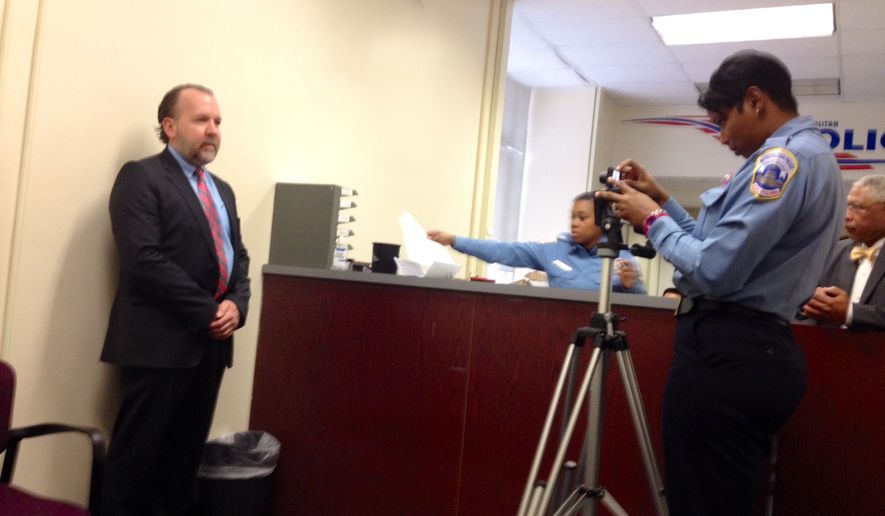OPINION:
Mark Witaschek never had a firearm in the District of Columbia, but he is now on the city’s Gun Offenders Registry.
This bizarre case has drawn national attention because an upstanding citizen was tried and convicted of possessing unregistered ammunition for muzzleloader bullets, which are simply pieces of lead and copper.
On Friday afternoon, I accompanied Mr. Witaschek and his wife, Bonnie, to Metropolitan Police Department headquarters to abide by the terms of his sentence, which meant registering within 48 hours.
Immediately inside the front doors and metal detectors is the Gun Offenders Registry Unit, which has suddenly appeared in the same office space as what was the Firearms Registry Unit. A white piece of paper taped over the existing painted sign indicated the office switch.
“They label it ’gun-offender registry’ to sound like a sex-offender registry,” Mr. Witaschek noted.
There were five uniformed officers and one plainclothes cop manning the unit. We were the only civilians. Mr. Witaschek quietly gave his name and said why he was there.
“We’ve been waiting for you,” said Officer Flores, which startled the Witascheks.
“We have emails about who is coming. We check off a list,” explained Officer Robinson.
The cops gave Mr. Witaschek forms to fill out, including the “initial gun-registry unit form” which asked for information such as name, address, height, weight, race, work, contact name and parole officer.
He had to sign into an old, thick hardbound book that was inscribed on the front “Gun Offenders Registry.” It sat on the counter between the cops and the public. I asked Officer Flores what the book was used for and where it was stored.
“You’ll have to file a Freedom of Information to know that,” she replied. I told her that I would.
Next, it was time for a mugshot.
SEE ALSO: MILLER: Exclusive - Mark Witaschek takes the stand in D.C. shotgun shell trial
Officer Robinson told Mr. Witaschek to stand against a white wall while she took three pictures with a point-and-shoot camera on a tripod.
During the registration process, Mr. Witaschek was repeatedly told by the police that the requirements of the registry didn’t apply to him, since he now lives in Virginia.
That’s why he filled out a form “Gun Offender Registry Requirements for Non-Residents,” that says that the District of Columbia Gun Offender Registry Law does not apply to people who don’t work, live or attend school in the city.
Mr. Witaschek had to sign the form to verify that he will personally appear at the registry office within 48 hours if he moves to or works in the city.
But the terms of the gun-registry and how the list is used are cloaked in mystery.
The Gun Offender Registry was enacted in 2009 in the gun-control law written by the D.C. Council after the Supreme Court ruled in the Heller decision that the 30-year-old ban on handguns was unconstitutional.
In the statute, the registry cannot be made public, like a sex-offenders registry. However, Police Chief Cathy L. Lanier is lawfully allowed to “make gun-offender registration information available to other local, state or federal government agencies.”
Chief Lanier’s spokesman, Gwendolyn Crump, would only say that the “Criminal Investigations Division Gun Offender Registry maintains the list.”
An aide to D.C. Council Chairman Phil Mendelson, who wrote the original law, explained that the list is an “internal tool” for the police. She said that the list is for “enhanced monitoring by the Department after court monitoring ends, and also a deterrent for offenders, who are aware that they are on the registry.”
It is not clear whether someone on the D.C. gun-offenders list would be blocked from passing an FBI background check to purchase a firearm.
Neither the police nor the D.C. Council could tell me if the list is put in the FBI’s National Instant Background Check system.
Federal law bars felons from possessing guns, but people such as Mr. Witaschek who are convicted of nonviolent misdemeanor offense are on this registry.
For example, I wrote in 2012 about Army Spc. Adam Meckler, who was forced onto the gun-offenders registry for having long-forgotten loose rounds of 9mm ammo in the District.
For Mr. Witaschek, the registration process took less than 30 minutes sinc e no other offenders were in the office at the same time.
Outside the police station, I asked Mr. Witaschek how he felt about submitting to this requirement of his sentence given by Judge Robert Morin.
“I was found guilty of something that is not even illegal and forced to register for something that is not illegal,” Mr. Witaschek said. He paused, then he just shook his head.
Mr. Witaschek is appealing his conviction both on technical grounds that muzzleloaders bullets are not classified as ammunition under the law and on the constitutional grounds that his Second Amendment rights have been infringed.
Emily Miller is senior editor of opinion for The Washington Times and author of “Emily Gets Her Gun” (Regnery, 2013).




Please read our comment policy before commenting.